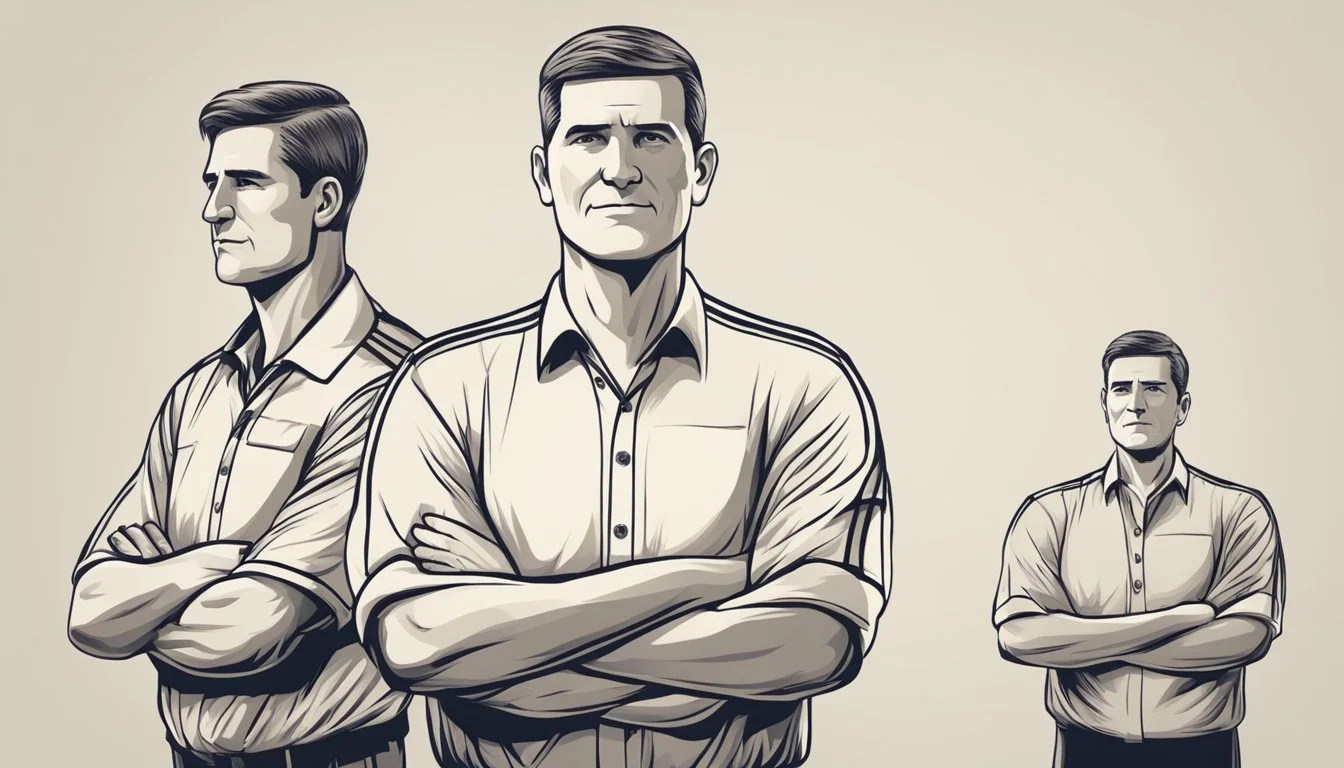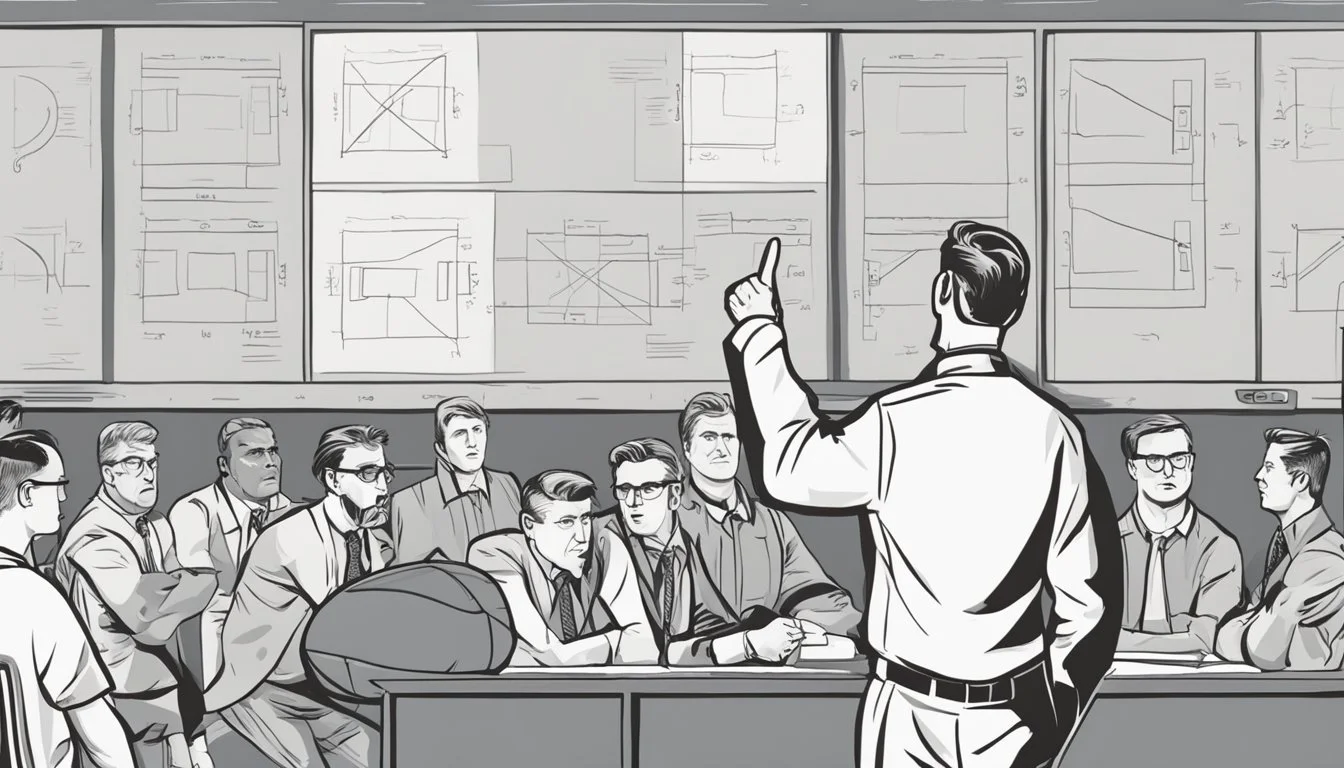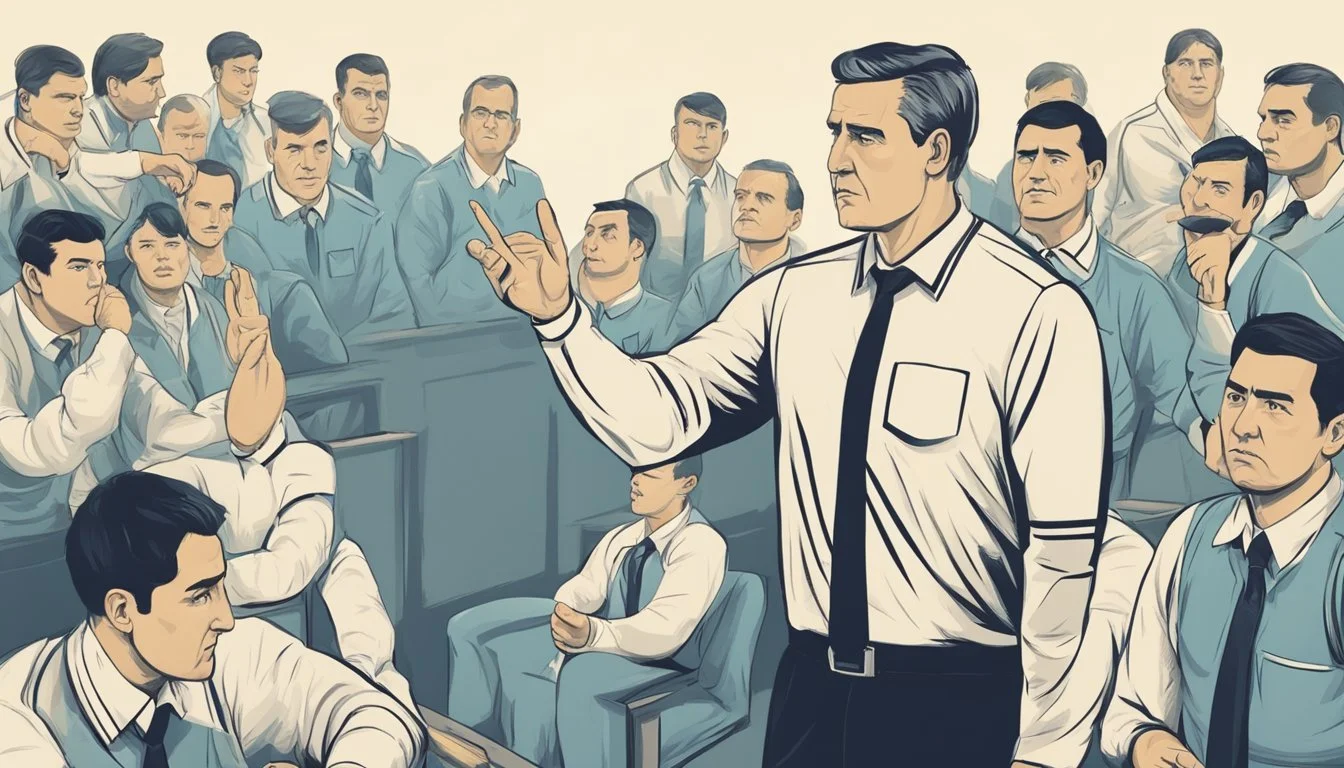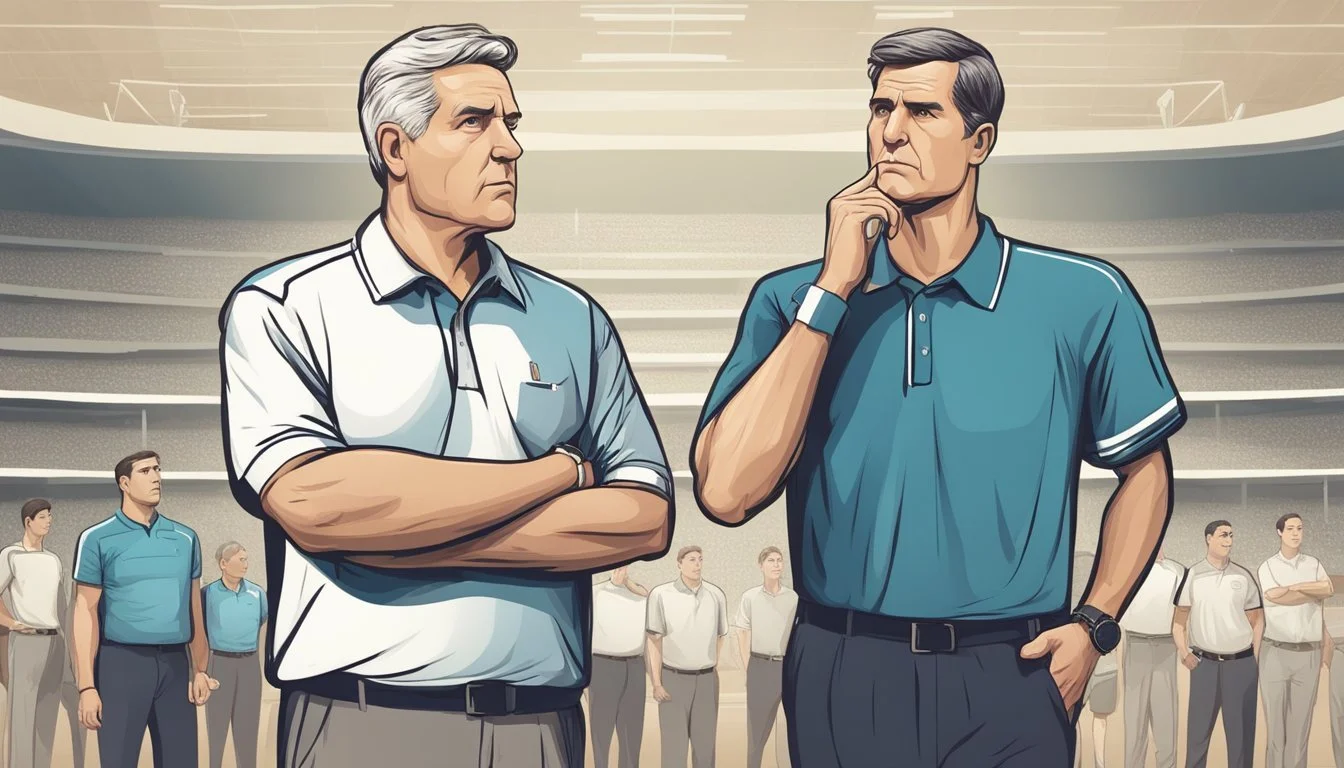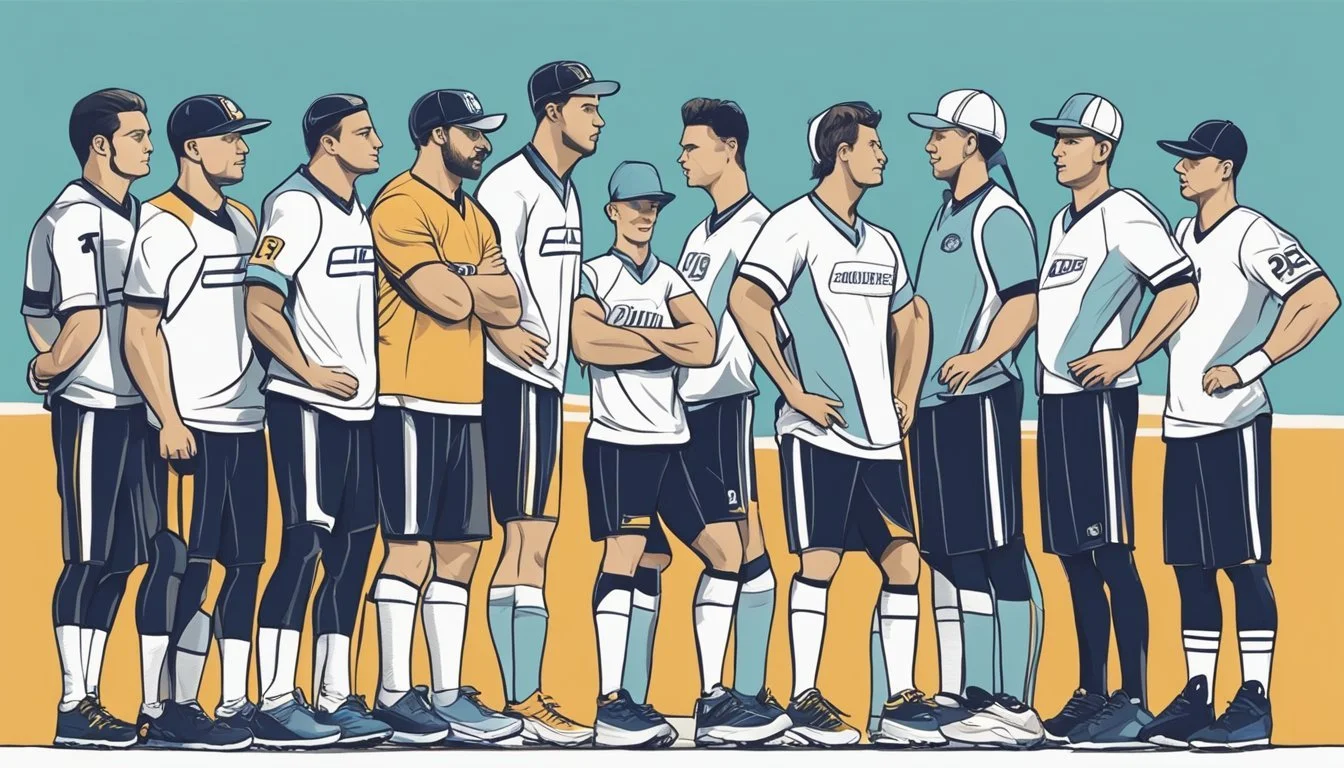10 Signs You're Dealing with a Narcissistic Coach or Sports Official
Red Flags to Watch Out For
Navigating relationships in sports can be challenging, especially when dealing with individuals who exhibit narcissistic tendencies. Coaches and sports officials who display such behaviors can significantly impact the performance and mental well-being of athletes.
Understanding the characteristics of a narcissistic coach or sports official is crucial for maintaining a healthy and productive sports environment. This article will help you recognize the signs and provide strategies to handle these situations effectively, ensuring that both athletes and officials can thrive.
1) Constant Need for Praise
Narcissistic coaches or sports officials display a constant need for praise. They crave validation and frequently seek admiration from those around them, often going to great lengths to receive compliments.
This need for admiration can manifest in various ways. They might frequently boast about their accomplishments or skills. They often expect others to acknowledge their superior abilities or achievements.
In team settings, they may highlight their role in any success and downplay the contributions of others. Their need for praise can also lead to manipulative behavior, where they use compliments to influence and control others.
This behavior can create a toxic environment. Players and colleagues may feel pressured to constantly affirm the narcissist’s ego, detracting from a healthy, collaborative atmosphere. This constant need for validation is a key sign of narcissistic behavior in a coaching or officiating role.
For more details, spotting narcissistic behavior can provide additional insights into these traits.
2) Belittling Comments
A narcissistic coach or sports official often uses belittling comments to undermine the confidence of athletes. These comments are intended to demean and control, making players feel inadequate.
Statements like “You’ll never be good enough” or “You’re too slow” are commonly used. Such remarks can cause significant emotional distress and lower self-esteem in athletes.
It’s important to recognize that this behavior is about exerting power and control rather than constructive criticism.
Athletes subjected to these tactics might doubt their abilities or lose passion for the sport. This toxic environment can hinder personal growth and team cohesion.
Addressing and standing up against this form of verbal abuse can be crucial for maintaining a healthy sporting environment.
Narcissistic individuals thrive on making others feel small, so dismissing or confronting these comments can be an effective countermeasure.
Discovering these tendencies early can help individuals seek necessary support and potentially remove themselves from a damaging situation.
Understanding the signs of belittling comments is vital for preserving mental well-being and ensuring a respectful and encouraging sports environment.
3) Gaslighting Tactics
In the realm of sports, a narcissistic coach or official may employ gaslighting tactics to maintain control and manipulate their athletes or colleagues.
Gaslighting involves denying reality, even when clear evidence is presented. A coach might insist an event didn't happen as remembered, causing the athlete to doubt their memory.
Gaslighters often distort or twist facts, making the reality seem different. For example, a coach might change the details of a past game to make the team seem less competent.
Blaming others for mistakes is a common tactic. A narcissistic official might insist the team's failure was due to the players' errors, despite clear evidence of poor coaching.
The use of subtle comments or off-hand remarks to undermine someone's confidence is also prevalent. This may include belittling an athlete's achievements or questioning their abilities.
Narcissistic gaslighters often isolate their targets, creating an environment where the athlete feels unsupported. This can make the victim more reliant on the manipulator's perspective.
Lastly, these individuals might use positive reinforcement to control. By giving praise selectively, they keep the athlete constantly seeking approval and validation.
Recognizing these tactics can help individuals protect themselves from the harmful effects of narcissistic gaslighting in sports contexts. For further details on recognizing these behaviors, please refer to Ryan Hart's article on gaslighting.
4) Lack of Empathy
A key sign of a narcissistic coach or sports official is a lack of empathy. They often fail to understand or share the feelings of others. This can lead to a dismissive attitude towards the emotions and needs of athletes.
Narcissistic individuals may use cognitive empathy to manipulate rather than support. For example, they might feign concern to gain control or achieve self-serving goals. This behavior can create a toxic environment.
Coaches or officials with narcissistic traits may also show little remorse or compassion when their decisions negatively impact others. They tend to focus on their own needs and objectives, disregarding the well-being of the team or athletes.
They frequently misread emotional cues and facial expressions, which can hinder their ability to connect with athletes on a personal level. This misinterpretation often leads to misunderstandings and increased tension within the team.
Additionally, a narcissistic coach may exhibit passive-aggressive behavior, masking their true feelings with insincere empathy. This can confuse and frustrate athletes who rely on genuine guidance and support for their development and well-being.
Understanding these behaviors is crucial in identifying narcissistic tendencies. Athletes deserve leaders who genuinely care about their success and emotional health. Recognizing a lack of empathy can help in addressing and mitigating the adverse effects of narcissistic coaching.
5) Playing Favorites
A narcissistic coach often plays favorites among team members. This behavior can erode the team's morale and unity. The coach's chosen players may receive more playing time, better opportunities, or preferential treatment.
This favoritism can make other athletes feel undervalued and overlooked, impacting their confidence and performance. The coach's favoritism isn't usually based on merit but rather on personal preference or manipulation.
Athletes not in the favored group may be unjustly criticized or ignored. This can create an unhealthy, competitive environment where fair play and equal opportunity are compromised.
Parents and players might notice this favoritism when the coach seems more interested in boosting the favored players' egos rather than developing everyone’s skills. If a coach's favoritism is persistent, it can lead to a divided team and disgruntled players.
Encouraging open communication and seeking feedback can help address favoritism issues. Letting the coach know that all athletes deserve a fair chance might prompt a change in behavior.
Unfortunately, in some cases, speaking out might not resolve the issue. Seeking advice from other leaders or considering different coaching options could be necessary to ensure a positive sports experience.
6) Inability to Handle Criticism
A narcissistic coach or sports official often exhibits a marked inability to handle criticism. Any form of negative feedback can elicit a strong emotional response.
Rather than accepting constructive feedback, they may react with defensiveness or anger. This reaction stems from a fragile ego that perceives criticism as a personal attack.
For instance, they might become unnecessarily confrontational or dismissive. Such behavior not only creates a hostile environment but also discourages open communication.
Their response may include attempts to undermine or discredit the critic. This could involve publicly berating the person or spreading unfounded rumors to protect their self-image.
The inability to handle criticism could also lead them to avoid situations where their authority might be questioned. They may isolate themselves from honest discussions.
In a team setting, this can be particularly damaging. Athletes or officials may feel disrespected or afraid to express their opinions, leading to a breakdown in teamwork.
Understanding this behavior is crucial for recognizing and managing interactions with a narcissistic coach or sports official. Identifying such traits early can help mitigate the negative impact on the team or organization.
For more detailed signs, you might find resources such as this checklist useful.
7) Arrogant Behavior
A common sign of a narcissistic coach or sports official is their arrogant behavior. They often believe they are superior to others and look down on both players and colleagues.
Such individuals may disregard advice or feedback, believing they know best. This can lead to a toxic team environment where collaboration and mutual respect are lacking.
Arrogant behavior also manifests in the way they handle victories and defeats. They might boast excessively about wins, attributing success solely to their own efforts, while blaming others for any losses.
Interactions with a narcissistic coach can be demoralizing. Their tendency to dismiss others' opinions can stunt the personal and professional growth of those around them. This behavior often creates a hostile atmosphere that hinders team morale and development.
Identifying and addressing this arrogance is crucial for maintaining a supportive and productive sports environment.
8) Manipulative Tactics
Narcissistic coaches or sports officials often employ manipulative tactics to control athletes and other team members.
One common tactic is guilt and shaming. These individuals may make team members feel responsible for any failures or underperformance, shifting blame away from themselves.
Labeling is another strategy. They may use demeaning terms or nicknames to undermine confidence and create a sense of powerlessness among athletes.
Gaslighting, where the coach or official denies events or facts, can lead players to doubt their own perceptions and judgments. This tactic can destabilize an athlete's sense of reality.
Isolation is also used by discouraging relationships within the team, making athletes more dependent on the narcissistic individual for validation and support.
Love-bombing follows. They may offer excessive praise and attention, only to withdraw it suddenly to create emotional volatility and dependence.
Triangulation involves pitting team members against each other. By spreading rumors or favoritism, they create conflict and maintain control over the group's dynamics.
Demanding absolute loyalty and discouraging any dissent is another common approach. Athletes who question the narcissist's authority may face harsh penalties or exclusion.
Lastly, narcissistic individuals may constantly shift the goalposts. They change expectations or rules arbitrarily, making it impossible for team members to meet standards consistently.
For further reading on manipulation tactics used by narcissists, refer to this article.
9) Shifting Blame
Narcissistic coaches or sports officials frequently use blame-shifting as a manipulative tactic. When something goes wrong, they avoid taking responsibility and instead place the blame on others. This tactic deflects attention from their own shortcomings.
Blame-shifting can exploit existing power dynamics. In a coach-player relationship, the coach’s authority makes it easier to shift blame, leaving the athlete feeling at fault. This manipulation can erode the self-esteem of those involved.
One common method involves gaslighting, where the coach denies events or conversations, making the player doubt their own memory. This technique creates confusion and makes it hard to challenge the coach’s narrative.
By portraying themselves as victims, narcissistic coaches seek sympathy and shift responsibility. They may recount past hardships to elicit a protective reaction from others, diverting attention from their own actions. This behavior manipulates the perception of the situation.
Understanding these signs can help identify a narcissistic coach or sports official. Recognizing blame-shifting is crucial in maintaining mental well-being and protecting oneself from manipulative tactics. For more insights on this manipulative tactic, visit Narcissist Blame Shifting.
10) Obsessed with Winning
A narcissistic coach or sports official typically places an extreme emphasis on winning. Their self-worth is often tied to the success of the team.
They may push athletes too hard, ignoring their well-being to achieve victory. This relentless drive can lead to burnout and injuries.
Their obsession with winning often includes taking credit for successes while blaming others for failures. This creates a toxic environment, fostering resentment among team members.
Their constant need for admiration and recognition drives this behavior. You can see this in their relentless pursuit of trophies and accolades.
For more signs of narcissism, visit these insights. This aligns with other common traits, such as a lack of empathy and boundary issues.
Understanding Narcissism
Narcissism involves a cluster of personality traits and behaviors centered on self-importance, entitlement, and a lack of empathy. Key components include an inflated sense of self and a constant need for admiration.
Defining Narcissistic Traits
Narcissistic traits are characterized by an exaggerated sense of self-importance. Individuals may believe they are superior to others and deserve special treatment. These traits often manifest as a need for excessive admiration, a sense of entitlement, and arrogance. Narcissists typically have a fragile self-esteem, relying on external validation to maintain their self-worth. They may respond with aggression or disdain when they feel criticized or don't receive the attention they crave. This reliance on external validation creates a cycle of dependency on the approval of others.
Common Behaviors of Narcissists
Narcissists often exhibit exploitative behaviors, using others to achieve their own goals. They lack empathy, making it difficult for them to recognize or respect the feelings and needs of others. Frequently, they engage in manipulative tactics to maintain control and dominance in relationships. Emotionally, they may seem detached, unable to form genuine connections. In social settings, they may monopolize conversations, often exaggerating achievements to appear more impressive. They may also experience frequent envy and feel threatened by the success of others. These behaviors can create a toxic environment, especially in hierarchical settings like sports teams or coaching scenarios.
Impact on Athletes and Teams
The presence of a narcissistic coach can deeply alter the psychological wellbeing of individual athletes and disrupt overall team dynamics. Each impact can significantly affect performance and cohesion.
Psychological Effects on Athletes
Athletes under the guidance of narcissistic coaches often experience heightened stress and anxiety. These coaches tend to focus heavily on their own achievements and control, which may diminish an athlete's self-esteem and sense of autonomy. The persistent need for validation from the coach can result in athletes feeling inadequate or constantly judged, leading to burnout.
Furthermore, athletes might struggle with self-worth as they try to meet unrealistic expectations set by the coach. Negative feedback is often more frequent than positive reinforcement, causing self-doubt. This toxic environment can sap an athlete's passion and enjoyment for the sport, replacing it with pressure and resentment.
Team Dynamics and Performance
Team performance can suffer considerably under narcissistic leadership. These coaches may prioritize their own image over the team's success, making decisions that showcase their authority rather than benefit the group. This can lead to inconsistent strategies and poor morale among team members.
Communication breakdowns are common. Narcissistic coaches might not foster open dialogue, leading to misunderstandings and unresolved conflicts within the team. Trust, a key component for team success, may erode as players feel unsupported and undervalued.
Additionally, player relationships often become strained in such environments. Favoritism is more likely, creating divisions within the team. The focus on individual accolades over collective effort diminishes teamwork, which is crucial for cohesive performance. As a result, the team may struggle to achieve its full potential, hampering long-term success.
Strategies for Coping and Recovery
Coping with and recovering from the impact of a narcissistic coach or sports official can involve setting clear personal boundaries and seeking professional support. These steps can help you regain control and rebuild your confidence.
Identifying and Setting Boundaries
Setting boundaries is crucial when dealing with a narcissistic coach or sports official. Boundaries are the limits you set to protect your emotional well-being.
Start by identifying behaviors that are unacceptable, such as manipulation, belittlement, or excessive criticism. Make a list of these behaviors and practice assertively communicating your boundaries. For example, if a coach constantly belittles you, firmly state that such comments are unwelcome and unwarranted.
Additionally, ensure that consequences for overstepping boundaries are clear. It’s important to follow through with these consequences to maintain the integrity of the boundaries. Seek support from teammates or trusted friends who can help reinforce these boundaries.
Regularly reviewing and adjusting your boundaries as needed can help maintain a healthy and respectful interaction.
Seeking Professional Help
Professional help is often vital in recovering from the psychological impact of a narcissistic authority figure. Therapists specializing in narcissistic abuse can provide tailored strategies and coping mechanisms.
Therapy can help you understand the dynamics of narcissistic behavior and its effects on you. Cognitive-behavioral therapy (CBT) is particularly effective in helping individuals reframe negative thought patterns and build resilience.
In addition to individual therapy, support groups offer a platform to share experiences and gain insights from others who have faced similar challenges. They provide validation and reduce feelings of isolation.
Professionals can also guide you in developing self-care routines that focus on rebuilding self-esteem and confidence, which may have been eroded during the abusive relationship. Engaging in regular physical activity, hobbies, and mindfulness practices can support this process.


